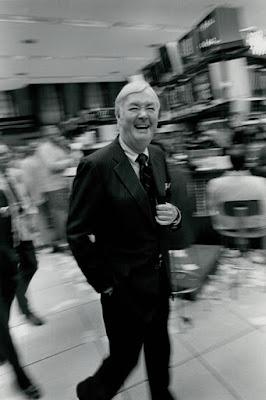The impossibility of consistent, increasing economic growth -- that growth is one of the tenets of Capitalism, now coming home to roost in globalism's henhouse of horror -- was, not coincidentally, one of the tenets of a forward-thinking fellow named David Fleming (on poster, right), who died in 2010 and is now receiving some of the credit due him for his progressive ideas.
The hour-long presentation, THE SEQUEL, just out on DVD and co-written and directed by Peter Armstrong tries with some success to give us the basic ideas of Fleming, while simultaneously demonstrating how they can be applied to what's happening worldwide today.
The approach of Mr. Armstrong (I think that is he, shown at left) and that of Shaun Chamberlin (shown below) -- the latter served as co-writer and executive producer of the film and for whom Fleming was a teacher and mentor -- is a bit scattershot.
There's a little history, a little biography, and a lot of contemporary application of Fleming's ideas -- after which and eventually some of this coalesces into both a philosophy and a kind of primer on what's coming to this world we inhabit, and how we might best deal with that future.
Mr. Chamberlin, who managed to bring Fleming's long-gestating oeuvre to posthumous publication as Lean Logic: A Dictionary for the Future and How to Survive It, clearly had a very loving relationship with his mentor, and that love can be felt throughout this short film.
During the course of the documentary we see a number of ways in which human beings can learn to rely on what Fleming called the "informal economy" rather than on the market economy; feeding our selves locally, rather than using supermarkets (which are here referred to as scams); making use of local shops (as below) devoted to fixing broken things rather than discarding them and buying new ones; and overall letting go of our current culture, civilization and all the rest of it.
Of course this takes some heavy-duty discipline, or as in the case of the country of Greece, below -- shown here as a kind of hallmark of the new world, thanks to its utterly failed market economy -- which was instead forced into having to learn new ways of adapting, particularly where health care is concerned. There are lots of talking heads throughout the film, and what most of them have to say makes a certain amount of sense.
You may, as did I, bridle at the section devoted to "encounter" (in this case with a muntjac deer, below), in which we are meant to empathize so strongly with an animal that we can somehow fully understand and "feel" it. As much as some of us might love, appreciate and want to protect animals and their environment, at this point in the film, you may start rolling your eyes and muttering, "Don't fuck things up with this nonsense!"
Otherwise, however, The Sequel has a lot to offer. If, in its positive-thinking manner, it chooses to mostly ignore mankind's history and proclivity toward power, greed and slavery (which certainly fuel Capitalism and the market economy as much as does anything else), it at least offers a partial roadmap for traveling the continuing downturn of that economy.
From Bullfrog Films (distributed by Icarus Home Video) and running just 61 minutes, the film hit DVD last month and is available now for purchase (and, I hope somewhere soon, for rental, too). At the very least this short film should have viewers eager and willing to go back to its source.




























































